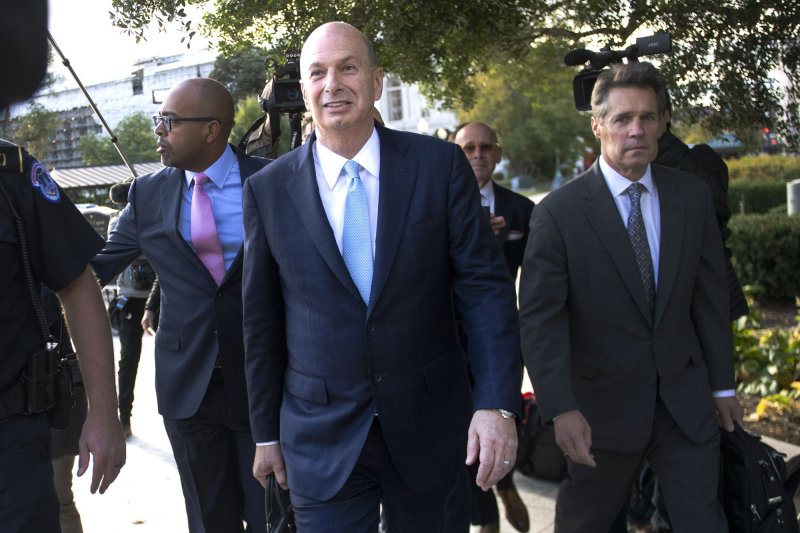U.S. Ambassador to the European Union Gordon Sondland arrives at the U.S. Capitol on October 17 for a deposition in the impeachment investigation of President Donald Trump. Photo by Kevin Dietsch/UPI |
License Photo
Nov. 5 (UPI) -- House lawmakers leading the impeachment investigation of President Donald Trump released more deposition transcripts Tuesday from an administration diplomat and a former envoy to Ukraine, one of whom made a significant change from his prior testimony.
The three House committees publicized testimony given last month by U.S. Ambassador to the European Union Gordon Sondland and former U.S. special representative to Ukraine Kurt Volker. Sondland testified on Oct. 17 and Volker on Oct. 3.
Both are considered important witnesses in the investigation, which seeks to determine whether Trump threatened to withhold military aid to Kiev to pressure Ukrainian officials to investigate Democratic presidential candidate Joe Biden and his son, Hunter Biden, a former board member at a Ukrainian gas company.
Sondland told investigators that pressure from Trump attorney Rudy Giuliani on Ukraine "kept getting more insidious" -- and that Trump once declared, "Ukraine is a problem."
Sondland also revised earlier testimony he gave to lawmakers -- recalling an occasion in which he told a Ukrainian presidential adviser in September that U.S. military aid earmarked for Kiev would be held up unless the country announced an anti-corruption investigation linked to the Bidens. The episode was added as supplemental testimony Sondland gave this week, when he'd told investigators he failed to recall the meeting with the Ukrainian adviser during his initial deposition last month.
Sondland said, though, that Trump never told him directly that the money would be withheld pending the probe, but that it was his own presumption. He also said he wasn't aware the anti-corruption investigation would have involved the Bidens.
"Because I believe I testified that it would be improper to do that," he said.
However, both Trump and Giuliani publicly called attention to the Bidens and their connection to the Ukrainian gas company, Burisma.
Volker, meanwhile, said he was aware the request for the probe was linked to the Bidens.
White House press secretary Stephanie Grisham reacted to the release of the transcripts, sticking to Trump's claim that the impeachment probe is a witch hunt.
"Both transcripts released today show there is even less evidence for this illegitimate impeachment sham than previously thought," she said.
"Ambassador Sondland squarely states that he 'did not know, (and still does not know) when, why or by whom the aid was suspended.' He also said he 'presumed' there was a link to the aid -- but cannot identify any solid source for that assumption. By contrast, Volker's testimony confirms there could not have been a quid pro quo because the Ukrainians did not know about the military aid hold at the time. No amount of salacious media-biased headlines, which are clearly designed to influence the narrative, change the fact that the president has done nothing wrong."
Monday, the committees publicized the testimony of former U.S. Ambassador to Ukraine Marie Yovanovitch and Peter Michael McKinley, a former aide to Secretary of State Mike Pompeo.
According to those transcripts, Yovanovitch and McKinley told investigators of concerns they had about Trump's handling of Ukraine policy -- and particularly the fashion in which Trump recalled and ultimately removed Yovanovitch from her diplomatic post in May. Both expressed concern that the State Department had failed to support them and instead chose to side with Trump's political agenda.
Also Tuesday, the committees called on acting White House chief of staff Mick Mulvaney to be deposed later this week. The chairs of the House intelligence, foreign affairs and oversight committees requested Mulvaney give testimony Friday in a letter.
"Based on evidence gathered in the impeachment inquiry and public reporting, we believe that you possess substantial first-hand knowledge and information relevant to the House's impeachment inquiry," they wrote.
"Specifically, the investigation has revealed that you may have been directly involved in an effort orchestrated by President Trump, his personal agent, Rudolph Giuliani, and others to withhold a coveted White House meeting and nearly $400 million in security assistance in order to pressure Ukrainian President Volodymyr Zelensky to pursue investigations that would benefit President Trump's personal political interests, and jeopardized our national security in attempting to do so."
On Oct. 17, Mulvaney told reporters the Trump administration withheld the security aid to Ukraine to pressure the country to investigate Russian interference in the 2016 election.
"Did he also mention to me in the past the corruption related to the [Democratic National Committee] server? Absolutely. No question about that. But that's it, that's why we held up the money," Mulvaney said of Trump.
He later backtracked, accusing the media of "deciding to misconstrue" his comments.
"Let me be clear, there was absolutely no quid pro quo between Ukranian military aid and any investigation into the 2016 election," Mulvaney said. "The president never told me to withhold any money until the Ukrainians did anything related to the server. The only reasons we were holding the money was because of concern about lack of support from other nations and concerns over corruption."
Earlier Tuesday, the Justice Department said in a new memo government attorneys must be allowed to accompany witnesses from the executive branch who cooperate with investigators.
"[This] ensures that executive branch employees called to testify before Congress do not improperly disclose privileged information, and that the information provided is consistent with the scope of Congress's investigative authority," the memo, authored by Assistant Attorney General Steven Engle, states.
"We believe that these same principles apply to a congressional committee's effort to compel the testimony of an executive branch official in an impeachment inquiry."















